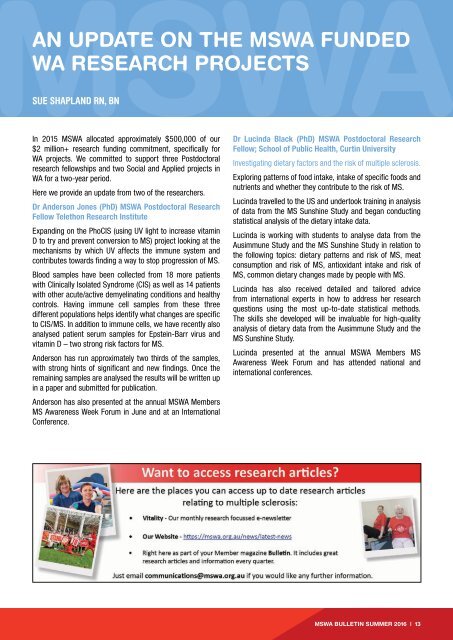MSWA Bulletin Summer 16
You also want an ePaper? Increase the reach of your titles
YUMPU automatically turns print PDFs into web optimized ePapers that Google loves.
AN UPDATE ON THE <strong>MSWA</strong> FUNDED<br />
WA RESEARCH PROJECTS<br />
SUE SHAPLAND RN, BN<br />
In 2015 <strong>MSWA</strong> allocated approximately $500,000 of our<br />
$2 million+ research funding commitment, specifically for<br />
WA projects. We committed to support three Postdoctoral<br />
research fellowships and two Social and Applied projects in<br />
WA for a two-year period.<br />
Here we provide an update from two of the researchers.<br />
Dr Anderson Jones (PhD) <strong>MSWA</strong> Postdoctoral Research<br />
Fellow Telethon Research Institute<br />
Expanding on the PhoCIS (using UV light to increase vitamin<br />
D to try and prevent conversion to MS) project looking at the<br />
mechanisms by which UV affects the immune system and<br />
contributes towards finding a way to stop progression of MS.<br />
Blood samples have been collected from 18 more patients<br />
with Clinically Isolated Syndrome (CIS) as well as 14 patients<br />
with other acute/active demyelinating conditions and healthy<br />
controls. Having immune cell samples from these three<br />
different populations helps identify what changes are specific<br />
to CIS/MS. In addition to immune cells, we have recently also<br />
analysed patient serum samples for Epstein-Barr virus and<br />
vitamin D – two strong risk factors for MS.<br />
Anderson has run approximately two thirds of the samples,<br />
with strong hints of significant and new findings. Once the<br />
remaining samples are analysed the results will be written up<br />
in a paper and submitted for publication.<br />
Anderson has also presented at the annual <strong>MSWA</strong> Members<br />
MS Awareness Week Forum in June and at an International<br />
Conference.<br />
Dr Lucinda Black (PhD) <strong>MSWA</strong> Postdoctoral Research<br />
Fellow; School of Public Health, Curtin University<br />
Investigating dietary factors and the risk of multiple sclerosis.<br />
Exploring patterns of food intake, intake of specific foods and<br />
nutrients and whether they contribute to the risk of MS.<br />
Lucinda travelled to the US and undertook training in analysis<br />
of data from the MS Sunshine Study and began conducting<br />
statistical analysis of the dietary intake data.<br />
Lucinda is working with students to analyse data from the<br />
Ausimmune Study and the MS Sunshine Study in relation to<br />
the following topics: dietary patterns and risk of MS, meat<br />
consumption and risk of MS, antioxidant intake and risk of<br />
MS, common dietary changes made by people with MS.<br />
Lucinda has also received detailed and tailored advice<br />
from international experts in how to address her research<br />
questions using the most up-to-date statistical methods.<br />
The skills she developed will be invaluable for high-quality<br />
analysis of dietary data from the Ausimmune Study and the<br />
MS Sunshine Study.<br />
Lucinda presented at the annual <strong>MSWA</strong> Members MS<br />
Awareness Week Forum and has attended national and<br />
international conferences.<br />
<strong>MSWA</strong> BULLETIN SUMMER 20<strong>16</strong> | 13


















